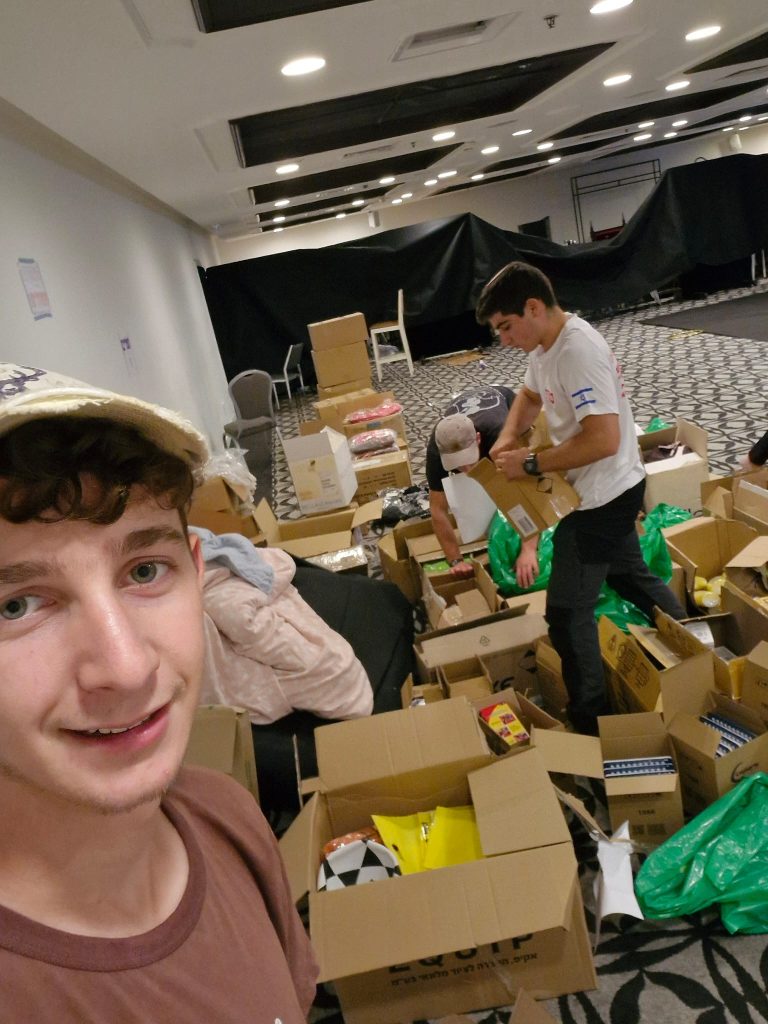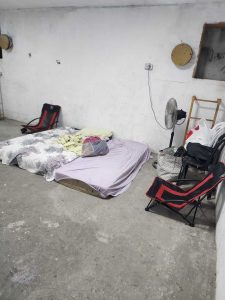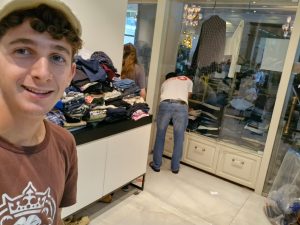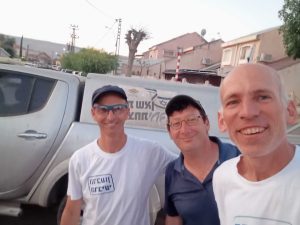Posted on Facebook on June 19, 2025
Home Front — what a strange combination of words.
Front is a military term, describing a place of war — a battlefield between trained soldiers, whether kinetic or cyber, especially in today’s modern world.
Home, on the other hand, is the realm of civilian life — where people build society in all its dimensions: living, working, culture, and leisure.
The home front is where civilian life and war collide — homes, schools, and streets become part of the battlefield. While soldiers fight on the front lines, civilians face sirens, rockets, and uncertainty. In Israel, the home front is not just a place of defense, but a space of resilience, unity, and daily courage.
Thus, the IDF Home Front Command is responsible for protecting Israel’s civilian population during emergencies such as wars, missile attacks, and natural disasters. It provides alerts, safety instructions, and coordinates rescue and emergency services across the country. Its mission is to ensure civilian preparedness and save lives.
Targeting civilians — whether they are living on the kinetic battlefield, under cyberattack, or simply going about daily life on the home front — is an act of war and terror. It violates every moral and legal norm of armed conflict. The deliberate assault on homes, schools, hospitals, and basic infrastructure is not merely collateral damage; it is a calculated strategy aimed at breaking the spirit of a people.
This threat must be eliminated (see my previous post). It is the first and foremost responsibility of any government to protect its citizens on the home front, and it should be unequivocally condemned by every responsible government and organization that values human life.
This is the reality on the ground: devastating images from Iranian missile strikes targeting innocent civilians across Israeli cities.
The home front also means that the citizens — the civilians of the State of Israel — are soldiers too. Soldiers without uniforms, engaged in the battle to ensure the continued existence of the Jewish and democratic state: the State of Israel.
In times of peace, they are responsible for building and sustaining a prosperous, just society — one that is both Jewish and democratic, grounded in a deep sense of purpose and connection to the land and its people.
A strong society, built on resilience, must be prepared for any threat that may materialize in our harsh geopolitical reality.
For years, a word often used in Israel to describe this kind of resilience is “להכיל” (lehakil) — which can be translated as “to endure,” “to absorb,” or “to withstand.” It reflects the idea that as long as the home front remains resilient and can endure the attacks, the IDF and the government gain more time and flexibility to carry out their mission.
It also carries an important implication: when the home front can no longer withstand the pressure — when civilians can no longer absorb the attacks — public support may erode, forcing the government and the military to halt operations before achieving their battlefield objectives. At that point, the leadership may need to shift to the political front, working to secure the best possible agreements based on the military gains achieved up to that moment, and as close as possible to the original goals.
This type of resilience, developed over the years, has complex implications for both the home front and Israel’s security forces. On the civilian side, we have raised generations of children under this model of resilience — generations that have grown up under constant threat and terror. But what is the tipping point of “endurance”?
Israeli communities surrounding the Gaza Strip “endured” one rocket a day, then five, then thirty, and eventually fifty rockets in a single day — only after which Israel launched a ground operation. This pattern repeated from 2007 until October 7th, 2023.
While resilience centers have helped communities prepare for and cope with such realities, the prolonged exposure has deeply affected the emotional, cognitive, and functional capacity of the home front.
For the army and security organizations, the home front’s ability to “endure” created a challenge: it blurred the urgency of fully understanding the enemy’s intent, means, and capabilities. The tragic result of this miscalculation became horrifically clear in the massacre carried out by Hamas on October 7th, 2023.
Eliminating the existential threat posed to Israel by the Iranian terrorist regime is once again challenging the resilience of our home front. Iran is launching horrific missiles at civilian targets — neighborhoods, schools, and hospitals.
Time and again, Israeli civilians have demonstrated extraordinary resilience in the face of such threats. The strength of the home front lies not only in preparedness, but in the unity, compassion, and determination of an entire society standing strong together.
These are soldiers without uniforms — civilian soldiers.
There is an ongoing debate in Israel regarding the strategy of resilience — the “enduring” approach. Not every civilian has access to a safe room or a nearby, clean, and secure shelter during ongoing attacks. This raises a critical question: how much of our resources should be invested in protecting the home front, and how much should be directed toward offensive operations to eliminate the threat?
If we had not invested in defense and civilian protection, our ability to endure would have quickly deteriorated, forcing Israel to respond with stronger and faster offensive action — possibly until achieving a final victory.
In my opinion, unfortunately, some irresponsible politicians are articulating positions against investing in methods that protect the home front, in favor of pursuing an absolute victory over the threats facing Israel. This is not only a failure of their basic duty to safeguard civilians — it is, in effect, an attack on the home front itself and on our society’s ability to remain strong and resilient.
Israel must invest fully in protecting the home front — because it saves lives, and we are in the business of life.
At the same time, Israel must invest fully in offensive action against a clear and imminent existential threat — because we are in the business of life.
The home front, all citizens of the state of Israel, and anyone residing in Israel during these challenging times, must follow the rules and regulations of the IDF home front command. It saves lives, and we are in the business of life.
The home front also means that the citizens — the civilians of the State of Israel — are soldiers too. Soldiers without uniforms, engaged in the battle to ensure the continued existence of the Jewish and democratic state: the State of Israel.
I am in total awe of our civil society — enduring a horrific assault from an enemy driven by a genocidal ideology aimed at eliminating the State of Israel. Yet our soldiers without uniforms continue to work, create, and sustain a prosperous country.
Hundreds of thousands of young people, hand in hand with veteran generations, are out in the field — volunteering, evacuating people and remains from areas hit by the Iranian attack, delivering assistance and supplies to those in need, and upholding the spirit of Israel. All of this is being carried out by countless civilian organizations from across the social and political spectrum.
Just to mention one: I had the privilege of helping set up bomb shelters under the auspices of The Fourth Quarter — a grassroots organization with thousands of members from diverse political and social backgrounds, all committed to building the next chapter of Israel’s future.
My son Amit is also out in the field with his friends, under the same umbrella, helping those who were evacuated from the devastated areas. A generation to be proud of.

We see this not only as our civic duty and responsibility — but as a privilege to serve our people.
I root for those on the side of building society.
I have full trust in our society.
It is also our duty to continue advocating for the return of our hostages held in Gaza by the terrorist organization Hamas — we are not a complete civil society until they come home.
Am Yisrael Chai.




